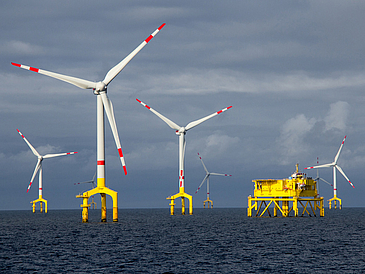An important accolade for the Federal State of Bremen as a location for science: The University of Bremen and the Fraunhofer IWES in Bremerhaven are to receive 11.5 million euros in funding from the Federal Ministry for Economic Affairs and Energy for a joint project with industrial companies. The results of the forthcoming three-year research project with the short name “HiPE-WiND” should lead to a significant increase in the service life of power electronics in wind turbines.
Offshore facilities are subject to manifold stress factors
“HiPE-WiND” stands for “Multidimensional loads on the high-performance electronics incorporated in wind turbines”. And indeed, the demands on wind turbines are highly complex – especially on the high sea, which is why these constructions are the main focus of research. “For offshore installations, reliability is even more important than on land, because they’re not so easy to access for repairs and maintenance”, explains Professor Bernd Orlik from the Institute of Electric Drives, Power Electronics and devices (IALB) of the University of Bremen. “So far, too little is known about how the special environmental conditions and operating situations to which power electronics are exposed in offshore wind parks affect their service life.”
New load testing facility
That will change now. In order to be able to investigate the high-performance electronics incorporated in wind turbines under combined climatic and electrical loads, test and experimental facilities will shortly be built in Bremen. Soon, a vendor-neutral, multimodal load testing facility for high-performance electronics of today’s and future wind turbines will be available in the Hanseatic city.
Sometimes cold, sometimes hot ....
The researchers using the facility will be able to subject complete converter systems for wind turbines with outputs of up to 10 megawatts to controlled environmental conditions. “Sometimes we let the power converters work in extremely cold temperatures, then again in heat and high humidity,” says Bernd Orlik. “At the same time, ‘normal’ electrical loads as well as simulated disturbances and system interactions are applied at random”.
Answering questions in an application-oriented way
How does all this influence the sensitive assemblies and components in the focus of research? What is the impact on system life? How can the robustness of power electronics be improved? These are some of the questions that the experts from Bremen and Bremerhaven will soon be conducting application-oriented research on together with three businesses in the wind energy industry.
University of Bremen press release on the new research project (German only)

